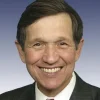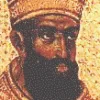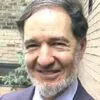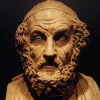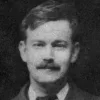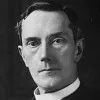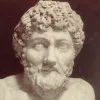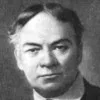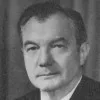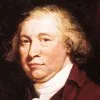The dictators cannot seem to realize that here in America our people can maintain two parties, and at the same time maintain an inviolate and indivisible Nation. The totalitarian mentality is too narrow to comprehend the greatness of a people who can be divided in party allegiance at election time, but remain united in devotion to their country and to the ideals of democracy at all times.
Franklin Delano Roosevelt (1882-1945) American lawyer, politician, statesman, US President (1933-1945)
Speech (1941-03-29), Jackson Day Radio Broadcast, U.S.S. Potomac
(Source)
Quotations about:
unity
Note not all quotations have been tagged, so Search may find additional quotes on this topic.
We must overcome our fear of each other by seeking out the humanity within each of us. The human heart contains every possibility of race, creed, language, religion and politics. We are one in our commonalities. Must we always fear our differences?
Unity, like so many good things, is good only in moderation. The same can be said of disunity.
Jane Jacobs (1916-2006) American-Canadian journalist, author, urban theorist, activist
Dark Age Ahead, ch. 1 “The Hazard” (2004)
(Source)
The great misfortune, the root of all the evil to come, was the loss of faith in the value of personal opinions. People imagined that it was out of date to follow their own moral sense, that they must all sing the same tune in chorus, and live by other people’s notions, the notions which were being crammed down everybody’s throat.
Boris Pasternak (1890-1960) Russian poet, novelist, and literary translator
Doctor Zhivago [До́ктор Жива́го], Part 2, ch. 13 “Opposite the House of Caryatids,” sec. 14 [Yury] (1955) [tr. Hayward & Harari (1958), UK ed.]
(Source)
Alternate translations:The main misfortune, the root of all evil to come, was loss of the confidence in the value of one's own opinion. People imagined that it was out of date of follow their own moral sense, that they must all sing in chorus, and live by other people's notions, notions that were crammed down everybody's throat.
[tr. Hayward & Harari (1958), US ed.]The main trouble, the root of the future evil, was loss of faith in the value of one’s own opinion. People imagined that the time when they followed the urgings of their moral sense was gone, that now they had to sing to the general tune and live by foreign notions imposed on everyone.
[tr. Pevear & Volokhonsky (2010)]
On the necessary points, unity. On the questionable points, liberty. In everything, love.
Augustine of Hippo (354-430) Christian church father, philosopher, saint [b. Aurelius Augustinus]
(Misattributed)
A commentary on theological / doctrinal dispute, frequently attributed to Augustine, but not found in his works.
The first known occurrence of such an expression is in Marco Antonio de Dominis, De Republica Ecclesiastica, Book 4, ch. 8, penultimate sentence (1617):Omnesque mutuam amplecteremur unitatem in necessariis, in non necessariis libertatem, in omnibus caritatem.
[And let us all embrace one another, unity in what is necessary, liberty in what is not necessary, charity in all things.]
The phrase was also adapted by Richard Baxter (1615-1691) as his motto. See also Rupertus Meldenius (1626).
More discussion about this quotation here: Liber locorum communium: In necessariis unitas, in non necessariis libertas, in utrisque caritas (Marco Antonio De Dominis, 1617), cf. In necessariis unitas, in dubiis libertas, in omnibus caritas (and other variants). English: "In essentials unity ..."
So I am thinking that atoms and humans and God may have minds that differ in degree but not in kind. We stand, in a manner of speaking, midway between the unpredictability of atoms and the unpredictability of God. Atoms are small pieces of our mental apparatus, and we are small pieces of God’s mental apparatus. Our minds may receive inputs equally from atoms and from God. This view of our place in the cosmos may not be true, but it is compatible with the active nature of atoms as revealed in the experiments of modern physics. I don’t say that this personal theology is supported or proved by scientific evidence. I only say that it is consistent with scientific evidence.
Freeman Dyson (1923-2020) English-American theoretical physicist, mathematician, futurist
“Progress in Religion,” Templeton Prize acceptance speech, Washington National Cathedral (9 May 2000)
(Source)
What is the opposite of two?
A lonely me, a lonely you.Richard Wilbur (1921-2017) American poet, literary translator
“Some Opposites,” Opposites (1973)
(Source)
Besides justifying the transfer of wealth to kleptocrats, institutionalized religion brings two other important benefits to centralized societies. First, shared ideology or religion helps solve the problem of how unrelated individuals are able to live together without killing each other — by providing them with a bond not based on kinship. Second, it gives people a motive, other than genetic self-interest, for sacrificing their lives on behalf of others.
Jared Diamond (b. 1937) American geographer, historian, ornithologist, author
Guns, Germs, and Steel, ch. 14 (1997)
(Source)
Understand, democracy does not require uniformity. Our founders argued. They quarreled. Eventually they compromised. They expected us to do the same. But they knew that democracy does require a basic sense of solidarity — the idea that for all our outward differences, we’re all in this together; that we rise or fall as one.
Barack Obama (b. 1961) American politician, US President (2009-2017)
“Farewell Address,” Chicago (10 Jan 2017)
(Source)
The avalanche of the Alps, which carries destruction in its gathering force, and whelms whole districts in its frozen shroud, acquired its tremendous force by UNION — the vast mass of cold destruction was accumulated flake by flake. Compare this figure yourselves — ye are the snow-flakes; gather then instruction from nature, single flakes form the avalanche, single grains of sand form mountains, single drops form the mighty ocean, and supply its resistless power!
(Other Authors and Sources)
Anonymous (“Jack Steadfast”), “To the Wealth Producers of Birmingham and of the Midland Counties,” Birmingham Journal (13 May 1837)
(Source)
The national unity of a free people depends upon a sufficiently even balance of political power to make it impracticable for the administration to be arbitrary and for the opposition to be revolutionary and irreconcilable. Where that balance no longer exists, democracy perishes. For unless all the citizens of a state are forced by circumstances to compromise, unless they feel that they can affect policy but that no one can wholly dominate it, unless by habit and necessity they have to give and take, freedom cannot be maintained.
Walter Lippmann (1889-1974) American journalist and author
“The Indispensable Opposition,” The Atlantic Monthly (Aug 1939)
(Source)
And in return may the gods grant you your heart’s desire; may they give you a husband and a home, and the harmony that is so much to be desired, since there is nothing nobler or more admirable than when two people who see eye to eye keep house as man and wife, confounding their enemies and delighting their friends, as they themselves know better than anyone.
[Σοὶ δὲ θεοὶ τόσα δοῖεν, ὅσα φρεσὶ σῇσι μενοινᾷς,
ἄνδρα τε καὶ οἶκον, καὶ ὁμοφροσύνην ὀπάσειαν
ἐσθλήν· οὐ μὲν γὰρ τοῦ γε κρεῖσσον καὶ ἄρειον,
ἢ ὅθ’ ὁμοφρονέοντε νοήμασιν οἶκον ἔχητον
ἀνὴρ ἠδὲ γυνή· πόλλ’ ἄλγεα δυσμενέεσσι,
χάρματα δ’ εὐμενέτῃσι· μάλιστα δέ τ’ ἔκλυον αὐτοί.]Homer (fl. 7th-8th C. BC) Greek author
The Odyssey [Ὀδύσσεια], Book 6, l. 180ff (6.180) [Odysseus to Nausicaa] (c. 700 BC) [tr. Rieu (1946)]
(Source)
Original Greek. The passage uses variations on the Greek term ὁμοφροσύνην (homophrosynê, likemindedness). Alternate translations:God give you, in requital, all th’ amends
Your heart can wish, a husband, family,
And good agreement. Nought beneath the sky
More sweet, more worthy is, than firm consent
Of man and wife in household government.
It joys their wishers-well, their enemies wounds,
But to themselves the special good redounds.
[tr. Chapman (1616)]And may Jove you with all you wish for bless,
A husband and a house, and concord good;
For man and wife to live in unity
Is the great’st blessing can be understood:
It joys your friend, and grieves your enemy.
[tr. Hobbes (1675), l. 172ff]So may the gods, who heaven and earth control,
Crown the chaste wishes of thy virtuous soul,
On thy soft hours their choicest blessings shed;
Blest with a husband be thy bridal bed;
Blest be thy husband with a blooming race,
And lasting union crown your blissful days.
The gods, when they supremely bless, bestow
Firm union on their favourites below;
Then envy grieves, with inly-pining hate;
The good exult, and heaven is in our state.
[tr. Pope (1725)]And may the Gods thy largest wishes grant,
House, husband, concord! for of all the gifts
Of heav’n, more precious none I deem, than peace
’Twixt wedded pair, and union undissolved;
Envy torments their enemies, but joy
Fills ev’ry virtuous breast, and most their own.
[tr. Cowper (1792), l. 226ff]And unto thee the heavenly gods make flow
Whate'er of happiness thy mind forecast,
Husband and home and spirit-union fast!
Since nought is lovelier on the earth than this,
When in the house one-minded to the last
Dwell man and wife -- a pain to foes, I wis,
And joy ot friends -- but most themselves know their own bliss.
[tr. Worsley (1861), st. 24]But, to thyself may the immortal gods
The largest wishes of thy heart fulfil!
A consort, home, and perfect peace therein
May they bestow! For nought in nobleness,
Nought in all virtue can the good surpass
Of perfect concord in the married pair
Whose blended counsels rightly rule their home:
Their foes with pain behold it! but, to all
Who wish them well, it is a joyful sight!
Joy, which themselves, 'bove all, can well discern!" [tr. Musgrave (1869), ll. 277ff]To thee the gods give all thy heart's desire!
A husband and home and loving hearts beside --
That best of gifts: for nought is better and braver
Than this, when man and wife unanimous
Hold their own home -- a sorrow they to foes --
A joy to friends -- and chiefest to themselves!
[tr. Bigge-Wither (1869)]And may the gods grant thee all thy heart’s desire: a husband and a home, and a mind at one with his may they give -- a good gift, for there is nothing mightier and nobler than when man and wife are of one heart and mind in a house, a grief to their foes, and to their friends great joy, but their own hearts know it best.
[tr. Butcher/Lang (1879)]And so may the high Gods give thee whatso thine heart holds dear,
A husband and a homestead, and concord whole and sound.
For nothing sure more goodly or better may be found
Than man and woman holding one house with one goodwill.
Thuis many a grief are they giving to those that wish them ill,
But great joy to their well-willers; and they wot it best of all.
[tr. Morris (1887)]And may the gods grant all that in your thoughts you long for: husband and home and true accord may they bestow; for a better and higher gift than this there cannot be, when with accordant aims man and wife have a home. Great grief is it to foes and joy to friends; but they themselves best know its meaning.
[tr. Palmer (1891)]May heaven grant you in all things your heart's desire -- husband, house, and a happy, peaceful home; for there is nothing better in this world than that man and wife should be of one mind in a house. It discomfits their enemies, makes the hearts of their friends glad, and they themselves know more about it than any one.
[tr. Butler (1898)]And for thyself, may the gods grant thee all that thy heart desires; a husband and a home may they grant thee, and oneness of heart -- a goodly gift. For nothing is greater or better than this, when man and wife dwell in a home in one accord, a great grief to their foes and a joy to their friends; but they know it best themselves.
[tr. Murray (1919)]And to you may the Gods requite all your heart's desire; husband, house, and especially ingenious accord within that house: for there is nothing so good and lovely as when man and wife in their home dwell together in unity of mind and disposition. A great vexation it is to their enemies and a feast of gladness to their friends: surest of all do they, within themselves, feel all the good it means.
[tr. Lawrence (1932)]And may the gods accomplish your desire:
a home, a husband, and harmonious
converse with him -- the best thing in the world
being a strong house held in serenity
where man and wife agree. Woe to their enemies,
joy to their friends! But all this they know best.
[tr. Fitzgerald (1961)]And then may the gods give you everything that your heart longs for;
may they grant you a husband and a house and sweet agreement
in all things, for nothing is better than this, more steadfast
than when two people, a man and his wife, keep a harmonious
household; a thing that brings much distress to the people who hate them
and pleasure to their well-wishers, and for them the best reputation.
[tr. Lattimore (1965)]And may the gods grant you what your heart wants most,
a husband and a home, and may there be
accord between you both: there is no gift
more solid and precious than such trust:
a man and woman who conduct their house
with minds in deep accord, to enemies
bring grief, but to their friends bring gladness, and --
above all -- gaine a good name for themselves.
[tr. Mendelbaum (1990)]And may the good gods give you all your heart desires:
husband, and house, and lasting harmony too.
No finer, greater gift in the world than that ...
when man and woman possess their home, two minds,
two hearts that work as one. Despair to their enemies,
joy to all their friends. Their own best claim to glory.
[tr. Fagles (1996)]And for yourself, may the gods grant you
Your heart's desire, a husband and a home,
And the blessing of a harmonious life.
For nothing is greater or finer than this,
When a man and woman live together
With one heart and mind, bringing joy
To their friends and grief to their foes.
[tr. Lombardo (2000), l. 183ff]Then may the gods grant you what you in your spirit are wishing; may they endow you with blessings, a husband and house, and a noble concord of mind: for than this there is no gift better or greater, when both husband and wife in concord of mind and of counsel peacefully dwell in a house -- to their enemies greatest affliction, joy to benevolent friends, but especially known to their own hearts.
[tr. Merrill (2002)]And may the gods grant you your heart's desire; may they give you a husband and a home, and the blessing of harmony so much to be desired, since there is nothing better or finer than when two people of one heart and mind keep house as man and wife, a grief to their enemies and a joy to their friends, and their reputation spreads far and wide.
[tr. DCH Rieu (2002)]Then may the gods grant you all that you desire in your heart, and may they bestow on you a husband, a house, and a good harmony of minds; there is nothing better or more powerful than this, when a man and his wife keep house in sympathy of mind -- a great grief to their enemies, but a joy to those who wish them well; and they themselves are highly esteemed.
[tr. Verity (2016)]So may the gods grant all your heart's desires, a home and husband, somebody like-minded. For nothing could be better than when two live in their minds in harmony, husband and wife. Their enemies are jealous, their friends delighted, and they have great honor.
[tr. Wilson (2017)]May the gods grant as much as you desire in your thoughts,
A husband and home, and may they give you fine likemindness,
For nothing is better and stronger than this
When two people who are likeminded in their thoughts share a home,
A man and a wife—this brings many pains for their enemies
And joys to their friends. And the gods listen to them especially.
[tr. @sentantiq (2018)]And may the gods grant you all that your heart desires, husband, home, and like-mindedness -- a precious gift, for there's nothing greater or better, ever, than when two like-minded people are keeping house together, a man and his wife: much frustration for their ill-wishers, much joy for their friends, but they two know it the best.
[tr. Green (2018)]As for you, may gods grant
everything your heart desires -- may they give
a husband, home, and mutual harmony,
a noble gift -- for there is nothing better
or a stronger bond than when man and wife
live in a home sharing each other’s thoughts.
That brings such pain upon their enemies
and such delight to those who wish them well.
They know that too, more so than anyone.
[tr. Johnston (2019)]
If a predatory enemy to our species can’t unite everyone on Earth to fight it, I’m left wondering what hope remains for Civilization.
Neil deGrasse Tyson (b. 1958) American astrophysicist, author, orator
Twitter (19 Apr 2020)
(Source)
Regarding the COVID-19 pandemic.
Such is the unity of all history that any one who endeavors to tell a piece of it must feel that his first sentence tears a seamless web.
F. W. Maitland (1850-1906) English legal historian and jurist [Frederic William Maitland]
“A Prologue to a History of English Law,” Law Quarterly Review (Jan 1898)
(Source)
Prologue to the 2nd ed. of his and Pollock's History of English Law (1898). Frequently mis-paraphrased, "The law is a seamless web."
Tolerance is a very dull virtue. It is boring. Unlike love, it has always had a bad press. It is negative. It merely means putting up with people, being able to stand things. No one has ever written an ode to tolerance, or raised a statue to her. Yet this is the quality which will be most needed after the war. This is the sound state of mind which we are looking for. This is the only force which will enable different races and classes and interests to settle down together to the work of reconstruction.
E. M. Forster (1879-1970) English novelist, essayist, critic, librettist [Edward Morgan Forster]
“The Unsung Virtue of Tolerance,” radio broadcast (Jul 1941)
(Source)
Published as "Tolerance," Two Cheers for Democracy (1951)
The real problem is that through our scientific genius we’ve made of the world a neighborhood, but through our moral and spiritual genius we’ve failed to make of it a brotherhood.
Martin Luther King, Jr. (1929-1968) American clergyman, civil rights leader, social activist, preacher
“Rediscovering Lost Values,” sermon, Second Baptist Church, Detroit (28 Feb 1954)
(Source)
The conception of men as united to each other, and of all mankind as united to God, by mutual obligations arising from their relation to a common end, which vaguely conceived and imperfectly realized, had been the keystone holding together the social fabric, ceased to be impressed upon men’s minds, when Church and State withdrew from the centre of social life to its circumference. What remained … was private rights and private interests, the materials of a society rather than a society itself.
We are all boarders on one table — White man, black man, ox and eagle, bee, & worm.
Surely there is no better way to stop the rising of new sects and schisms than to reform abuses; to compound the smaller differences; to proceed mildly, and not with sanguinary persecutions; and rather to take off the principal authors by winning and advancing them, than to enrage them by violence and bitterness.
Francis Bacon (1561-1626) English philosopher, scientist, author, statesman
“Of Vicissitude of Things,” Essays, No. 58 (1625)
(Source)
You develop an instant global consciousness, a people orientation, an intense dissatisfaction with the state of the world, and a compulsion to do something about it. From out there on the Moon, international politics look so petty. You want to grab a politician by the scruff of the neck and drag him a quarter of a million miles out and say, “Look at that, you son of a bitch.”
Edgar "Ed" Mitchell (1930-2016) American aviator, engineer, astronaut
(Attributed)
The earliest source I can find of the quote is in People (8 Apr 1974), where it appears as an epigraph for a story on Mitchell three years after his flight to the Moon.
The history of the Jews also shows that oppression and persecution are far more efficacious in binding a nation together than community of interest and national prosperity. Increase of wealth divides rather than unites a people; but suffering shared in common binds it together with hoops of steel.
We are a nation of many nationalities, many races, many religions — bound together by a single unity, the unity of freedom and equality. Whoever seeks to set one nationality against another, seeks to degrade all nationalities. Whoever seeks to set one race against another seeks to enslave all races. Whoever seeks to set one religion against another, seeks to destroy all religion.
America has never been united by blood or birth or soil. We are bound by ideals that move us beyond our backgrounds, lift us above our interests, and teach us what it means to be citizens. Every child must be taught these principles. Every citizen must uphold them; and every immigrant, by embracing these ideals, makes our country more, not less, American.
There is not a liberal America and a conservative America — there is the United States of America. There is not a black America and a white America and Latino America and Asian America — there’s the United States of America.
Barack Obama (b. 1961) American politician, US President (2009-2017)
Keynote speech, Democratic National Convention (26 Jul 2004)
(Source)
For harmony makes small states great, while discord undermines the mightiest empires.
[Nam concordia parvae res crescunt, discordia maxumae dilabuntur.]
Then join Hand in Hand, brave Americans all,
By uniting we stand, by dividing we fall.John Dickinson (1732-1808) American solicitor, politician, writer
“A Song for American Freedom” (“The Liberty Song”), Boston Gazette (18 Jul 1768)
See Aesop.
United we stand, divided we fall.
Aesop (620?-560? BC) Legendary Greek storyteller
Fables [Aesopica], “The Four Oxen and the Lion” (6th C BC) [tr. Jacobs (1894)]
(Source)
I am persuaded that the people of the world have no grievances, one against the other. The hopes and desires of a man who tills the soil are about the same whether he lives on the banks of the Colorado or on the banks of the Danube.
Lyndon B. Johnson (1908-1973) American politician, educator, US President (1963-69)
Speech (1947-05-07), House of Representatives
(Source)
As part of an argument that the increasing tension between the Soviet Union and the US was over ideology and government actions, not between peoples.
If men would consider not so much wherein they differ, as wherein they agree, there would be far less of uncharitableness and angry feeling in the world.
Joseph Addison (1672-1719) English essayist, poet, statesman
(Attributed)
Disputed. First attributed to "Addison" in the early 20th Century, in a paper by A. L. Evans, "Unity in Diversity," read before the Massachusetts Osteopathic Society (17 Mar 1906), and by Tryon Edwards, A Dictionary of Thoughts (1908). But this may have been a reference to another man of the same last name who was credited with publishing Interesting Anecdotes, Memoirs, Allegories, Essays, and Poetical Fragments (1794).
There are no problems which we cannot solve together, and very few that any of us can settle by himself.
Lyndon B. Johnson (1908-1973) American politician, educator, US President (1963-69)
Speech (1964-11-28), Press Conference, LBJ Ranch, Johnson City, Texas
(Source)
Regarding the Atlantic Alliance (NATO). Variant: "There are no problems we cannot solve together, and very few that we can solve by ourselves."
It is in our faults and failings, not in our virtues, that we touch one another and find sympathy. We differ widely enough in our nobler qualities. It is in our follies that we are at one.
Jerome K. Jerome (1859-1927) English writer, humorist [Jerome Klapka Jerome]
Idle Thoughts of an Idle Fellow, “On Vanity and Vanities” (1886)
(Source)
Must a government, of necessity, be too strong for the liberties of its own people, or too weak to maintain its own existence?
Abraham Lincoln (1809-1865) American lawyer, politician, US President (1861-65)
Message (1861-07-04) to Congress, Special Message, Washington, D. C.
(Source)
Lincoln's Special Message to Congress was to discuss the Civil War that had broken out, its origins, and how it represented this fundamental question about representative government.
Lincoln repeated this phrasing at the beginning of his speech (1864-11-10) responding to serenaders celebrating his re-election.Franklin Roosevelt quoted Lincoln during a pre-WW2 Jackson Day radio address (1941-03-29).
CYNICAL CAT: Little one, I would like to see anyone — prophet, king or God — persuade a thousand cats to do anything at the same time.
Neil Gaiman (b. 1960) British author, screenwriter, fabulist
Sandman, Book 3. Dream Country, # 18 “A Dream of a Thousand Cats” (1990-08)
(Source)
Whatever barriers we put up are gone. Even if it’s just momentary. We are judging people by not the color of their skin, but the content of their character. You know, all this talk about “These guys are criminal masterminds. They’ve gotten together and their extraordinary guile and their wit and their skill …” It’s, it’s — it’s a lie. Any fool can blow something up. Any fool can destroy. But to see these guys, these firefighters and these policemen and people from all over the country, literally with buckets, rebuilding … that’s extraordinary. And that’s why we have already won … they can’t … it’s light. It’s democracy. They can’t shut that down.
Jon Stewart (b. 1962) American satirist, comedian, and television host. [b. Jonathan Stuart Leibowitz]
The Daily Show (2001-09-20)
(Source)
Monologue on "September 11, 2001."
The reason I don’t worry about society is, nineteen people knocked down two buildings and killed thousands. Hundreds of people ran into those buildings to save them. I’ll take those odds every fucking day.
I am loathe to close. We are not enemies, but friends. We must not be enemies. Though passion may have strained, it must not break our bonds of affection. The mystic chords of memory, stretching from every battlefield and patriot grave, to every living heart and hearthstone, all over this broad land, will yet swell the chorus of the Union, when again touched, as surely they will be, by the better angels of our nature.
Abraham Lincoln (1809-1865) American lawyer, politician, US President (1861-65)
Speech (1861-03-04), Inaugural Address, Washington, D. C. (final paragraph)
(Source)
William Seward, though a political rival of Lincoln's, was invited by him to review the draft address. Seward suggested, as an added ending paragraph, the following, which was then adapted by Lincoln into the above:I close. We are not, we must not be aliens or enemies but fellow-countrymen. Although passion has strained our bonds of affection too hardly, they must not, I am sure they will not, be broken. The mystic chords which, proceeding from so many battle-fields, and so many patriot graves, pass through all the hearts and all the hearths in this broad continent of ours, will yet again harmonize in their ancient music when breathed upon by the guardian angel of the nation.
It is high time that we stopped thinking politically as Republicans and Democrats about elections and started thinking patriotically as Americans about national security based on individual freedom. It is high time that we all stopped being tools and victims of totalitarian techniques — techniques that, if continued here unchecked, will surely end what we have come to cherish as the American Way of Life.
Margaret Chase Smith (1897-1965) American politician (US Senator, Maine)
“Declaration of Conscience,” Congressional Record, vol. 96, 81st Congress, 2d. sess. (1 Jun 1950)
(Source)
Struggles to coerce uniformity of sentiment in support of some end thought essential to their time and country have been waged by many good, as well as by evil, men. Nationalism is a relatively recent phenomenon, but, at other times and places, the ends have been racial or territorial security, support of a dynasty or regime, and particular plans for saving souls. As first and moderate methods to attain unity have failed, those bent on its accomplishment must resort to an ever-increasing severity. […] Those who begin coercive elimination of dissent soon find themselves exterminating dissenters. Compulsory unification of opinion achieves only the unanimity of the graveyard.
Robert H. Jackson (1892-1954) US Supreme Court Justice (1941-54), lawyer, jurist, politician
West Virginia Board of Education v. Barnette, 318-319 U.S. 624 (1943) [majority opinion]
(Source)
Life has taught us that love does not consist of gazing at each other but in looking outward together in the same direction.
[L’expérience nous montre qu’aimer ce n’est point nous regarder l’un l’autre mais regarder ensemble dans la même direction.]
Antoine de Saint-Exupéry (1900-1944) French writer, aviator
Wind, Sand and Stars [Terre des Hommes], ch. 9 “Barcelona and Madrid (1936),” sec. 6 (1939) [US ed., tr. Galantiere]
(Source)
(Source (French)). Usually given as:Love does not consist of gazing at each other, but in looking together in the same direction.
[Aimer, ce n'est pas se regarder l'un l'autre, c'est regarder ensemble dans la même direction.]
It is bad religion to deify doctrines and creeds. While indispensable to religious life, doctrines and creeds are only so as signposts. Love alone is the hitching post. Doctrines, let’s not forget, supported slavery and apartheid; some still support keeping women in their places and gays and lesbians in limbo. Moreover, doctrines can divide while compassion can only unite. In other words, religious folk, all our lives, have both to recover tradition and to recover from it.
William Sloane Coffin, Jr. (1924-2006) American minister, social activist
Credo, “Faith, Hope, Love” (2004)
(Source)
On the necessary points, unity. On the questionable points, liberty. In everything, love.
[In necessariis unites, in non necessariis libertas, in omnibus caritas.]
Rupertus Meldenius (1582-1651) German writer [pseud. of Peter Meiderlin]
Paraenesis Votiva pro Pace Ecclesiae ad Theologos Augustanae Confessionis [Votive Counsel for the Peace of the Church, to the Theologians of the Augustan Confession] (1626)
Also translated as "essentials" and "non-essentials."
Paraphrase of final lines of the work:Verbo dicam: Si nos servaremus IN necesariis Unitatem, IN non-necessariis Libertatem, IN UTRISQUE Charitatem, optimo certe loco essent res nostrae.
[In a word, were we to observe unity in essentials, liberty in incidentals, and in all things charity, our affairs would be certainly in a most happy situation.]
Commonly attributed to St Augustine, but also to John Wesley, Richard Baxter, and several others.
It is from the numberless diverse acts of courage and belief that human history is shaped. Each time a man (or a woman) stands up for an ideal, or acts to improve the lot of others, or strikes out against injustice, he (or she) sends a tiny ripple of hope, and crossing each other from a million different centers of energy and daring, those ripples build a current which can sweep down the mightiest walls of oppression and resistance.
Robert Francis Kennedy (1925-1968) American politician
“Day of Affirmation,” address, University of Capetown, South Africa (6 Jun 1966)
(Source)
Inscribed on the RFK gravesite at Arlington National Cemetery as "It is from numberless diverse acts of courage and belief that human history is shaped. Each time a man stands up for an ideal, or acts to improve the lot of others, or strikes out against injustice, he sends forth a tiny ripple of hope, and crossing each other from a million different centers of energy and daring those ripples build a current which can sweep down the mightiest walls of oppression and injustice."
When bad men combine, the good must associate; else they will fall, one by one, an unpitied sacrifice in a contemptible struggle.
Edmund Burke (1729-1797) Anglo-Irish statesman, orator, philosopher
“Thoughts on the Cause of the Present Discontents” (23 Apr 1770)
May be the origin of the attributed (but never located in Burke's works): "The only thing necessary for the triumph of evil is for good men to do nothing."See also Mill.
In necessary things, unity; in disputed things, liberty; in all things, charity.
Human beings are like parts of a body,
created from the same essence.
When one part is hurt and in pain,
the others cannot remain in peace and be quiet.
If the misery of others leaves you indifferent
and with no feelings of sorrow,
You cannot be called a human being.بنیآدم اعضای یک دیگرند
که در آفرينش ز یک گوهرند
چو عضوى بهدرد آورَد روزگار
دگر عضوها را نمانَد قرار
تو کز محنت دیگران بیغمی
نشاید که نامت نهند آدمیSa'adi (1184-1283/1291?) Persian poet [a.k.a. Sa'di, Moslih Eddin Sa'adi, Mushrif-ud-Din Abdullah, Muslih-ud-Din Mushrif ibn Abdullah, Mosleh al-Din Saadi Shirazi, Shaikh Mosslehedin Saadi Shirazi]
“Bani Adam [The Children of Adam],” Gulistan [Rose Garden], ch. 1 “On the Conduct of Kings,” story 10 (1258)
(Source)
Also known as the "Poem on Humanity" or "Human Beings". This translation was quoted by President Carter in a toast to the Shah of Iran (31 Dec 1977). (Source (Persian)).
The poem, some of the most famous Persian/Iranian verses, was suggested as a motto for the League of Nations in 1928. It was long falsely rumored that the Bashiri translation (below) was posted as the entrance to the United Nations building in New York; however, a carpet with the poem inscribed in Persian was installed in 2005 in a meeting hall in the interior of the building. There is also a plaque on the wall of the UN commemorating the United Nations Year of Dialogue Among Civilizations (2001) with the Eastwick (1880?) translation (below).
Transliterations:[Bani Aadam `aazaye yek pigarand
Keh dar aafarinesh ze yek guharand
Cho `ozvi be dard aavarad rozigaar
Degar ozvahaa raa namaanad qaraar
To kaz mehnate digaraan bi ghami
Nashaayad ke naamat nahand Aadami]
[Source][banī ādam aʿzāy-e yek digarand
keh dar āfarīniesh zeh yek goharand
cho ʿozvī beh dard āwarad roozgār
degar ʿozvhā rā namānad qarār
to k'az meḥnat-e dīgarān bīghamī
nashāyad keh nāmat nahand ādamī]
[Source][Bani aadam a'adhaae yek peikarand,
Ke dar aafarinesh ze yek guharand.
Chu 'udhwi bedard aawarad ruuzgaar,
Degar 'udhwhaa raa namaanad gharaar.
Tu kaz mehnate digaraan biqamii,
Nashaayad ke naamat nehand aadami.]
[Farooqi (1987)]
Alternate translations:All Adam's race are members of one frame,
Since all, at first, from the same essence came.
When by hard fortune one limb is oppressed,
The other members lose their wonted rest:
If thou feel'st not for others' misery,
A son of Adam is no name for thee.
[tr. Eastwick (1852)]All human beings are members of one frame,
Since all, at first, from the same essence came.
When time afflicts a limb with pain
The other limbs at rest cannot remain.
If thou feel not for other’s misery
A human being is no name for thee.
[tr. Eastwick (1880?); it is suggested this is the 1880 translation by Eastwick, but that is the same as the 1852 above.]The sons of Adam are limbs of each other,
Having been created of one essence.
When the calamity of time affects one limb
The other limbs cannot remain at rest.
If thou hast no sympathy for the troubles of others
Thou art unworthy to be called by the name of a human.
[tr. Burton (1888)]All men are members of the same body,
Created from one essence.
If fate brings suffering to one member,
The others cannot stay at rest.
You who remain indifferent
To the burden of pain of others,
Do not deserve to be called human.
[tr. Rehatsek (1888)]All Adam's sons are limbs of one another
Each of the self-same substance as his brother.
So while one member suffers aches and grief,
The other members cannot win relief.
Thou, who are heedless of thy brother's pain,
It is not right at all to name thee man.
[tr. Arberry (1945)]Human beings are members of a whole,
In creation of one essence and soul.
If one member is afflicted with pain,
Other members uneasy will remain.
If you have no sympathy for human pain,
The name of human you cannot retain.
[tr. Aryanpour (1970)]Adam's sons are body limbs, to say;
For they're created of the same clay.
Should one organ be troubled by pain,
Others would suffer severe strain.
Thou, careless of people's suffering,
Deserve not the name, "human being."
[tr. Dastjerdi (1999)]Of One Essence is the Human Race,
Thusly has Creation put the Base.
One Limb impacted is sufficient,
For all Others to feel the Mace.
The Unconcern'd with Others' Plight,
Are but Brutes with Human Face.
[tr. Bashiri (2003)]All men and women are to each other
the limbs of a single body, each of us drawn
from life’s shimmering essence, God’s perfect pearl;
and when this life we share wounds one of us,
all share the hurt as if it were our own.
You, who will not feel another’s pain,
you forfeit the right to be called human.
[tr. Newman (2004)]Man’s sons are parts of one reality
Since all have sprung from one identity;
If one part of a body’s hurt, the rest
Cannot remain unmoved and undistressed;
If you’re not touched by others’ pain, the name
Of “man” is one you cannot rightly claim.
[tr. Davis (2012)]Human beings are limbs of one body indeed;
For, they’re created of the same soul and seed.
When one limb is afflicted with pain,
Other limbs will feel the bane.
He who has no sympathy for human suffering,
Is not worthy of being called a human being.
[tr. Salami]All human beings are in truth akin,
All in creation share in one origin.
When fate allots a member pangs and pains,
No ease for other members then remains.
If, unperturbed, another's grief canst can,
Thou are not worthy of the name of man.
[tr. Sharp]Human beings are body parts of each other,
In creation they are indeed of one essence.
If a body part is afflicted with pain,
Other body parts uneasy will remain.
If you have no sympathy for human pain,
The name of human you shall not retain.
[Source]Adam's children are limbs of one body
That in creation are made of one gem.
When life and time hurt a limb,
Other limbs will not be at ease.
You who are not sad for the suffering of others,
Do not deserve to be called human.
[Source]The children of Adam are the members of each other,
who are in their creation from the same essence.
When day and age hurt one of these members,
other members will be left (with) no serenity.
If you are unsympathetic to the misery of others,
it is not right that they should call you a human being.
[Source]
HENRY: Now join your hands, and with your hands your hearts.
William Shakespeare (1564-1616) English dramatist and poet
Henry VI, Part 3, Act 4, sc. 6, l. 39ff (4.6.39) (1591)
(Source)


